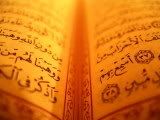So the question would arise what is this certainty? And how can one acquire this certainty? The Islamic literature which we hold with us today would indicate that the level of certainty is one of the highest states possible for man, and why should it not be? We find that this man has the potential to evolve to that extend where the kingdom of Heavens and Earth are laid open before his eyes and has the potential by where the angels look down on to him and glorify him as he whispers to his Lord in the middle of the night. The level of certainty is indeed a treasure which what all good men of Allah seek.
Imam Ali [as] in a narration states: 'The result of silence is wisdom; the result of wisdom is enlightenment; the result of enlightenment is certainty'. When we pay attention and contemplate over the words of the Hadith we would find great pearls of knowledge within it. Silence could be related to reflection, and reflection is something which has been emphasised greatly in the Quran. It is through reflection the son of Adam realizes the purpose of his existence, the effects of his deeds and the path on which he threads on. He sees the goal of life in front of him and it is through this reflection he proceeds to attain that goal. It is the process of reflection coupled with wisdom which leads to enlightment within us, something which we all seek be it at different levels within us.
When a person attains the exalted spiritual position of certainty, then he does not care how does he starts his day, whether with ease or hardship, tragedy or comfort. Such is the state of those who have attained the position of content, and whoever attains this position acquires three inseparable characteristics: thanks (shukr) not contaminated with ignorance, invocation (dhikr) not mixed with forgetfulness and love not mixed with the love of others. All this comes together to relate to the hadith of the Holy Prophet [pbuh]: 'Certainty is complete belief'. Without certainty there can never be evolution of the soul nor can there be any understanding of the fundamentals of Islam.
Certainty is divided into three levels. Below are stated the levels using an example to describe each level:
1. `Ilm al-Yaqin : Which is certain and permanent conviction. It is like the conviction of a man who when he sees smoke believes with certainty that there must be a fire too.
2. `Ayn al-Yaqin: Which is beholding something with-either the outer or the inner-eye. Using the above example, it is like the conviction of a man who not only sees the smoke but fire itself.
3. Haqq al-Yaqin: Which is the state of certainty acquired when a form of spiritual and actual union exists between the knower and the known thing. This would be the case, for example, if one should be himself in the midst of fire mentioned in the above example. This is called "the union of the knower and the known".Haqq al-Yaqin is the highest of the stages of certainty. It is the stage which is reached after one's soul is free from sins and corruption, when one's soul has reached the stage where it can receive and understand truth as well as be free from any blind imitation and prejudice.
In brief to attain certainty one must preform actions, since true faith and actions have reciprocating effects upon one another and thus in the Quran, alongside true faith (Iman), righteous actions have also been mentioned.
May Allah bestow upon us His blessings and shower His mercy in this great month of Rajab and may He give us the ability to attain the lofty levels of piety and wisdom through understanding Islam and its principles. May He hasten the reappearence of our Master Al Hujjah [ajtf]

